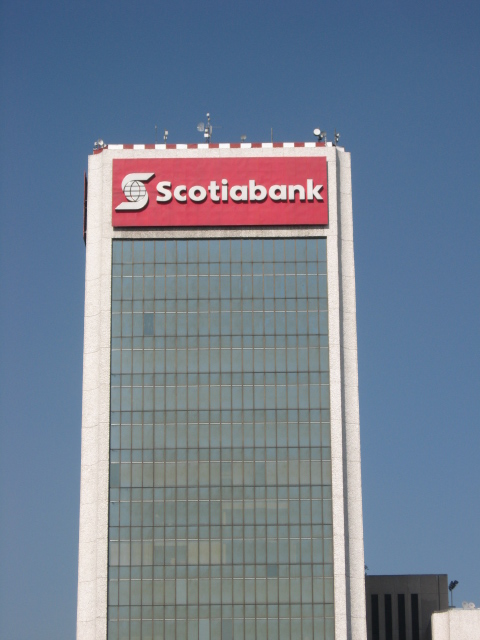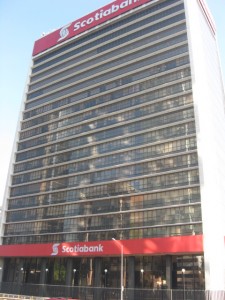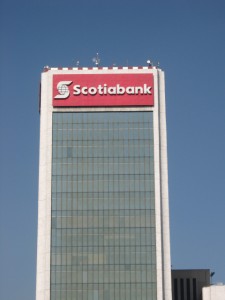
Get your money without paying service charges. Updated July 2022

Two large Scoitabanks in Mexico City
How to get your money in foreign countries without paying a fortune in service charges? You have lots of money in your home bank account but are on vacation. How do you get your money in foreign countries? There are several ways:
1. Cash Back
Go to Walmart or a large grocery store chain and buy some items. Ask for cash back. If your items cost $27.50 and you ask for $100.00 cash back, you will receive $100 in cash, and your debit card will be billed $127.50. This gets you $100 in cash with no service charges. It is also good for the store because they get rid of their cash, which is automatically deposited in their bank account. (Works great in USA and Canada; not in all countries. Debit cards only. It does not work with credit cards).
2. Use ATM at a traveller-friendly bank
A traveller-friendly bank is one you deal with or one of their partners. Banks, like airlines, have partnerships with companies in other countries that they do not deal with directly.
For example, if you live in Canada and stay in Canada all the time, then all Canadian banks are equal. But some are Canadian only, and some are international banks. Find out if your bank has branches in other countries. The best bank for travellers in Canada is Scotiabank. Scotiabank is one of the leading banks in Mexico, Peru, Chile and the Caribbean. Almost every town in Mexico and Belize has one, and there are many in large Mexican cities. You can withdraw cash from an ATM without service charges if you have a Scotiabank debit card.
If you go to a bank that is not a partner, you will pay service charges to the bank that gives you the cash and your bank at home. A typical cost for this is $3.00 at each end of the transaction. Making several per month at $6 per transaction will add to a lot of money. It is not so important if you are on vacation for only a week or so.
As Scotiabank is the leading bank in the Caribbean, Westpac is the main bank throughout the South Pacific and Barclays bank in UK and Africa. Here is a list of “traveller-friendly” banks with partners worldwide. If you travel a lot, you should consider getting an account at one of these banks if you don’t already have one:
ABSA- South Africa
Barclays Bank – England, Scotland, France, Gibraltar, Poland, Spain, Wales, Netherland Antilles, Seychelles, Uganda, Botswana, Bahamas, Zambia, Ghana, Kenya, Tanzania, Zimbabwe, Gabon, Mauritius
BNP Paribas – France
BNL – Italy
China Construction Bank – China
Deutsche Bank – Germany, Czech Republic, Italy, Poland, Spain, India
Scotiabank – Canada, Mexico, Belize, Caribbean Islands, Chile, Peru
UkrSibbank – Ukraine
United States – Bank of America and Citibank
Westpac – Australia, New Zealand, Cook Islands, Fiji, Papua New Guinea, Samoa, Solomon Islands, Tonga, Vanuatu
3. Use a Partner Bank
Some of these banks that have branches in several countries also partner with each other. For example, Scotiabank and Westpac are partners and honour each other’s debit cards. Before going on a trip, ask your bank for a list of partner banks worldwide.
4. Use Debit Cards for purchases
Whenever possible, use your debit card for purchases instead of cash. This will save you a lot of service charges at bank machines. Get a debit card with a Visa or Master Card logo, even if it is not a credit card. Some countries will not accept any card that does not have a Visa or Master Card logo. Always ask if the business accepts payment with debit cards. Some smaller hotels and grocery stores will accept debit cards, although there is no obvious sign of this service. Some restaurants even have wireless debit machines to bring to your table for payment.
4. Credit Cards
If, for some reason, you cannot use an ATM at one of the friendly banks or make your purchase with a debit card, buy things with a credit card rather than getting cash at another bank. Although high, the service charges on a credit card purchase are lower than what you will pay at ATMs. Keep in mind that the price of using the ATM that is displayed is for that bank only. Your bank back home will also charge you approximately an equal amount.
Then, if you have online banking, you can go online and pay back your credit card from your chequing or savings account before the end of the month and avoid service charges.
Using cash should be your last choice. However, depending on which country you are visiting, you may need it. Many countries are still cash-based economies.
4. Have two bank accounts
Don’t put all your eggs and money in the same bank. Have two bank accounts, even if the second one is not a partner in the bank alliance. Your second bank might have high service charges if you use their card in another country, but it can be a life-saver if you lose your primary card and are stranded with no money. So store the card in a separate place from your main one.
If you have a “significant other” travelling with you. Get two debit cards for each account and have each person carry one card. I have found that most banks will not give two identical cards to a single person.
Having two credit cards is also a good idea. It is always possible that one could get lost, stolen or hacked.
5. For travellers from Australia and New Zealand
Debit and Credit cards and cash from Australia and New Zealand is not accepted in some countries. Cuba is one of these. So if you are travelling to Cuba or another country with no modern economy, you will need to get a bank account with a European or North American bank.
The above applies to only a very few countries. You will not have a problem in Mexico or most third-world countries, but you will pay a hefty service charge. To avoid this, get a Global Currency Card from Westpac. You can move money from your bank account into this card in several currencies. Then you use it like a local debit card from the country you are visiting. You will pay a much lower service charge than a regular debit card.
6. Traveller’s Cheques
Don’t bother getting travellers’ cheques. In the internet and ATM age, they have become obsolete and not worth the service charges.
My Thatched Hit Travel Tips
Currency exchange booths at airports charge a huge transaction fee. Wait until you get to a bank if you can. Better still, order some cash in the currency of the country you are visiting from your local bank before you leave. Canadian banks sell several different currencies such as U.S. Dollar, Euros, Yen, and British Pounds. Most banks in the USA do not deal in foreign currencies.
Use your debit card at banks and ATMs to get cash but not for purchases. Use your credit card for purchases. You can pay it back from your online banking later or when you get home. If someone gets your debit card number and pin, they can drain your bank account. It is easier to dispute charges and get your money back with a credit card.
Never take your eyes off your credit card while making a purchase. It is very easy for someone to slip your card into a different machine under the table to make a copy of your information.
So now you know how to get your money in foreign countries without paying a fortune in service charges. Happy Trails.

Great info Tom. Hola.
very useful Tom, I didn´t know you could charge an extra amount in the debit card, I ´m not sure if is it possible do that in every country or just in USA or Canada
Probably will not work in every country. Definitely works in Canada and USA.